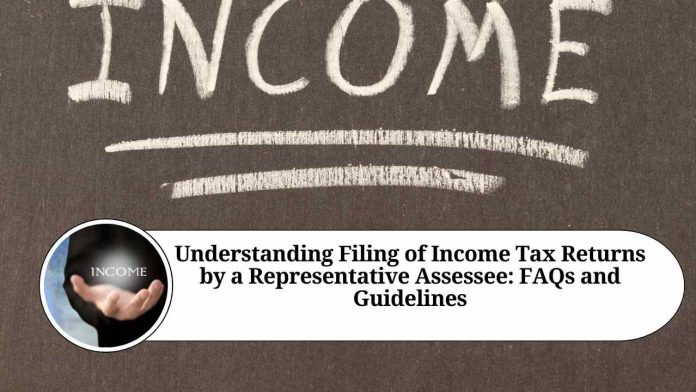Who is a representative assessee?
As per the Income Tax Act, 1961, a representative assessee is defined as a person who stands in a fiduciary relationship with another person. This relationship could arise in several situations, such as:
- Legal guardianship: A legal guardian can file an income tax return on behalf of a minor child or a person with a disability who is unable to file their own return.
- Estate of a deceased person: If a person dies, their legal representatives (such as an executor or administrator) can file a return on their behalf for the income earned up to the date of death.
- Trusts: Trustees of a trust can file a return on behalf of the trust if the income earned by the trust is chargeable to tax.
Significance of filing income tax return by a representative assessee
Filing income tax returns by a representative assessee is significant for several reasons. For instance:
- It is legally mandatory for a representative assessee to file an income tax return if the income earned is above the taxable limit.
- It helps ensure compliance with tax laws, prevents any legal or penal consequences due to non-compliance, and ensures that the tax liability of the concerned person or entity is duly discharged.
- In some cases, filing of an income tax return by a representative assessee can be more convenient than the person themselves, such as in cases of minors or persons with disabilities.
Rules for filing income tax returns by a representative assessee
If you are filing an income tax return as a representative assessee, there are certain rules that you must follow. These rules are as follows:
- You must clearly indicate in the return that you are filing it as a representative assessee.
- You must provide details of the person or entity on whose behalf the return is being filed, such as their name, PAN, and relationship with you.
- You must provide details of the income earned by the person or entity on whose behalf the return is being filed.
- You must also provide details of any deductions or exemptions claimed on behalf of the person or entity.
- You must ensure that all taxes due are paid before filing the return.
In cases of minors or persons with disabilities, it is important to note that the income earned by them is also subject to tax. Therefore, as a representative assessee, you must ensure that the tax liability of the concerned person is duly discharged.
It is also important to note that the rules for filing income tax returns by a representative assessee may vary depending on the type of entity. For instance, the rules for filing a return by a legal guardian of a minor may differ from those for filing a return on behalf of a trust or estate.
It is therefore recommended that you seek professional advice or consult a tax expert if you are unsure about the rules and regulations governing the filing of income tax returns by a representative assessee.
conclusion
the concept of representative assessee plays an important role in the Indian taxation system, and it is important to understand its significance and the rules governing its implementation. By following the rules and guidelines prescribed by the Income Tax Act, 1961, you can ensure compliance with tax laws and prevent any legal or penal consequences due to non-compliance.
Other Related Blogs: Section 144B Income Tax Act
Frequently Asked Questions (FAQs)
Q: Is it mandatory to file an income tax return as a representative assessee?
A: Yes, it is mandatory to file an income tax return as a representative assessee if the income earned by the person or entity on whose behalf you are filing the return exceeds the taxable limit.
Q: What are the rules for filing an income tax return as a representative assessee?
A: The rules for filing an income tax return as a representative assessee include indicating clearly in the return that it is being filed as a representative assessee, providing details of the person or entity on whose behalf the return is being filed, providing details of the income earned, and ensuring that all taxes due are paid before filing the return.
Q: What are the consequences of non-compliance with the rules for filing income tax returns as a representative assessee?
A: Non-compliance with the rules for filing income tax returns as a representative assessee can result in legal or penal consequences, including fines or penalties for non-compliance with tax laws.
Q: Can a representative assessee claim deductions or exemptions on behalf of the person or entity they are representing?
A: Yes, a representative assessee can claim deductions or exemptions on behalf of the person or entity they are representing, provided they meet the eligibility criteria for the same.
Q: Are the rules for filing income tax returns by a representative assessee the same for all types of entities?
A: No, the rules for filing income tax returns by a representative assessee may vary depending on the type of entity. For instance, the rules for filing a return by a legal guardian of a minor may differ from those for filing a return on behalf of a trust or estate.




















